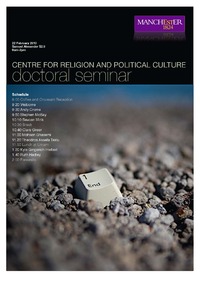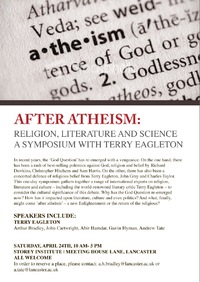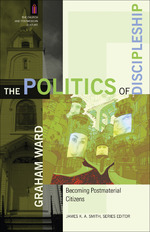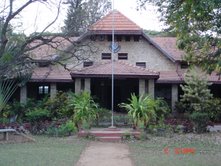Good news for students interested in applying for MA and PhD programmes in the Centre for Religion and Political Culture and the Lincoln Theological Institute. A number of funding opportunities have recently been announced within the University of Manchester's application framework.
The first thing to be aware of is that 5pm on 1 March, 2011 is the current application deadline for funding specifically for the Religions and Theology Subject Area's new and existing students. Complete applications for a place on either the MA or the PhD must be received by 15 February 2011. Further details on all Religions and Theology specific awards can be found by clicking here and here. Further details on awards at University level and other funding bodies can be found by clicking here.
 There are two prominent awards in particular which deserve special mention. Firstly, for UK/EU students, the Arts and Humanities Research Council (AHRC) has allocated two PhD studentships to the Religions and Theology Subject Area at the University of Manchester. This award covers the cost of tuition and maintenance. For overseas students, the Overseas Research Studentship (ORS) is now an internal University of Manchester award, of which there are two available to students in the School of Arts, Histories and Cultures. This award covers the difference between the cost of overseas tuition and UK/EU tuition. Students who win an ORS award will also be considered for the Religions and Theology Subject Area Home Fees bursary which, if awarded, would cover the remaining EU/UK fees.
There are two prominent awards in particular which deserve special mention. Firstly, for UK/EU students, the Arts and Humanities Research Council (AHRC) has allocated two PhD studentships to the Religions and Theology Subject Area at the University of Manchester. This award covers the cost of tuition and maintenance. For overseas students, the Overseas Research Studentship (ORS) is now an internal University of Manchester award, of which there are two available to students in the School of Arts, Histories and Cultures. This award covers the difference between the cost of overseas tuition and UK/EU tuition. Students who win an ORS award will also be considered for the Religions and Theology Subject Area Home Fees bursary which, if awarded, would cover the remaining EU/UK fees.
If you are interested in applying for these awards, you must submit the funding application form which is available by clicking here (DOC) (further details within the document itself). This form will then be considered alongside your submission of the University of Manchester online application for the MA or PhD programme of your choice. If you have any questions feel free to email us by clicking here.
 February 20, 2010 in
February 20, 2010 in  CRPC,
CRPC,  Doctoral Seminars
Doctoral Seminars  This coming week we'll be hosting our next doctoral seminar. Paper topics are listed below. Click here for a PDF of abstracts.
This coming week we'll be hosting our next doctoral seminar. Paper topics are listed below. Click here for a PDF of abstracts.  Email | Comments Off
Email | Comments Off 




